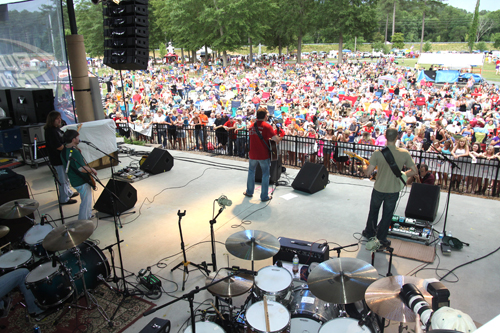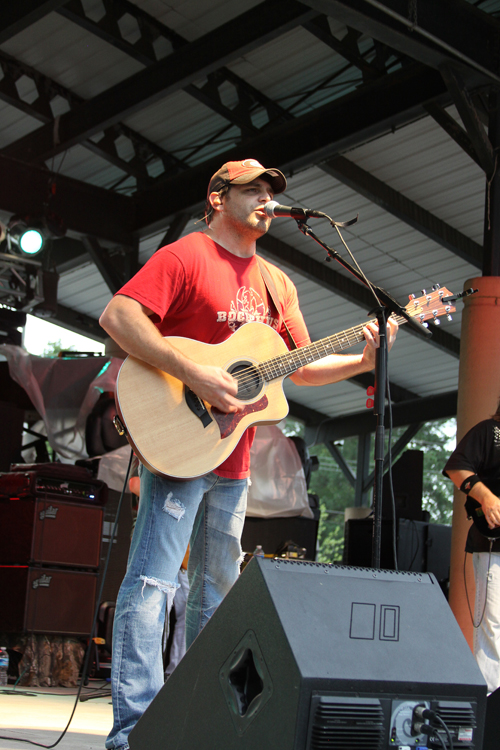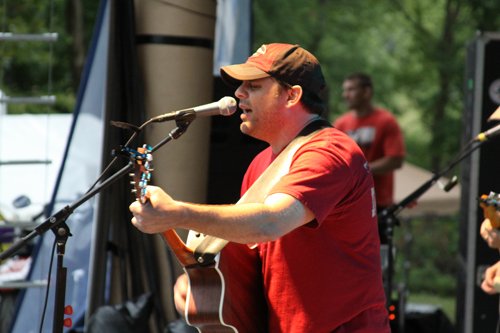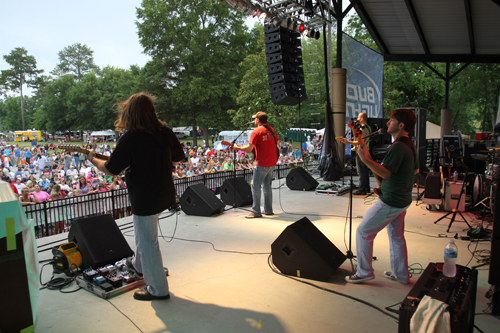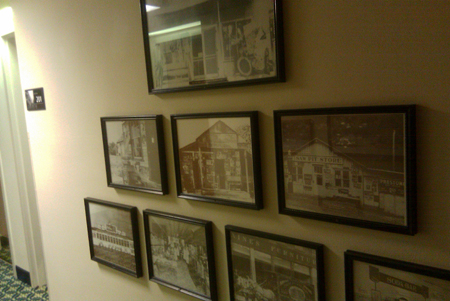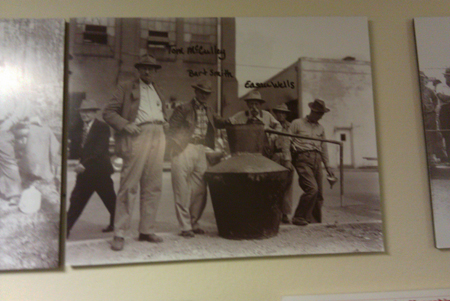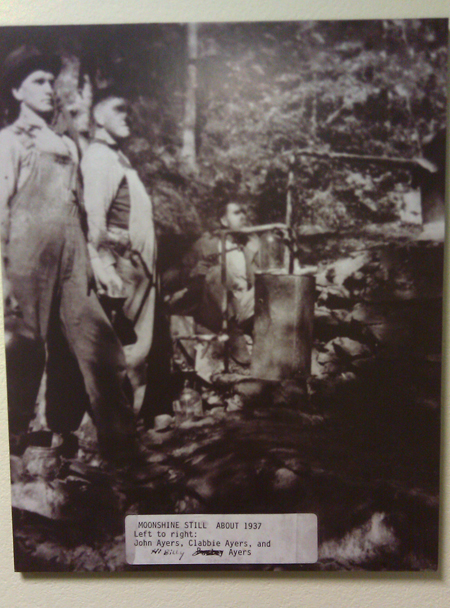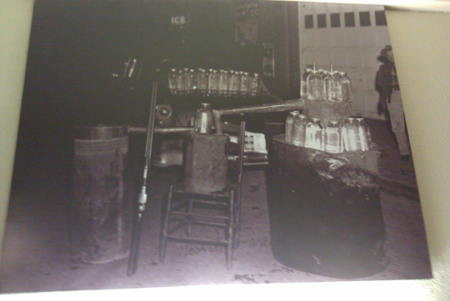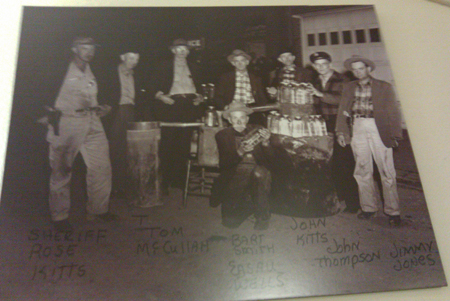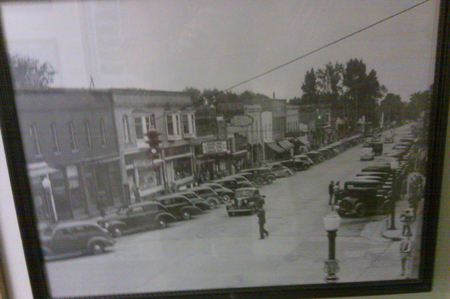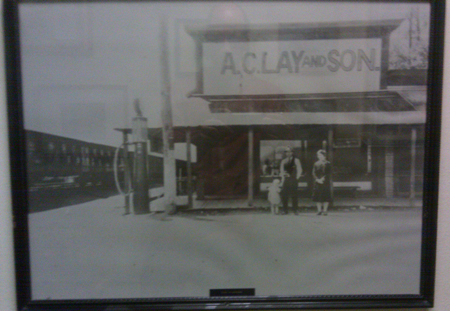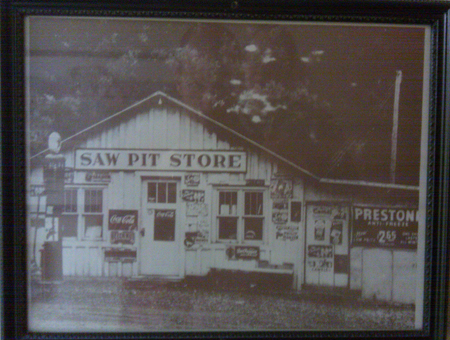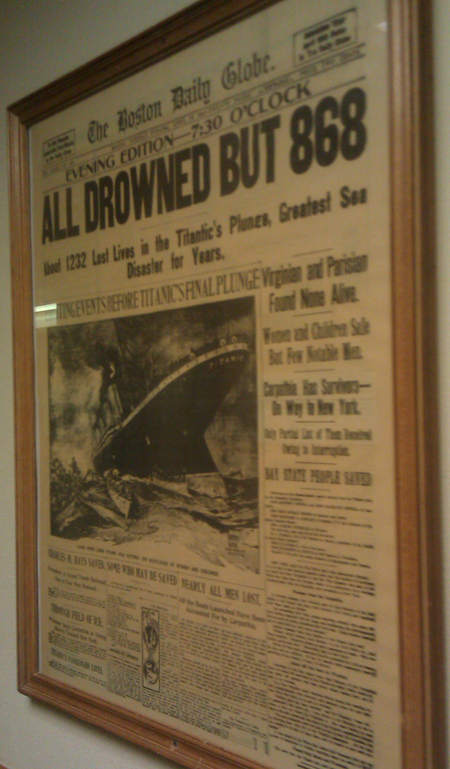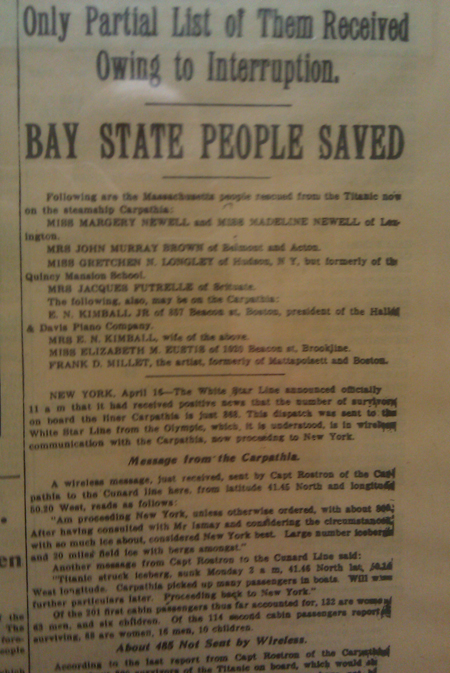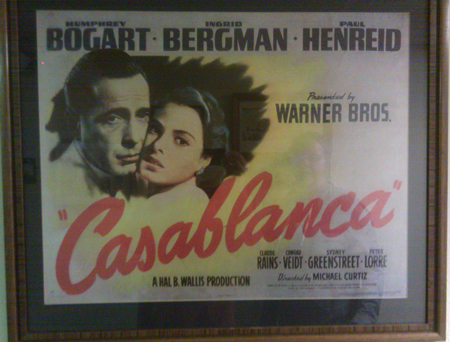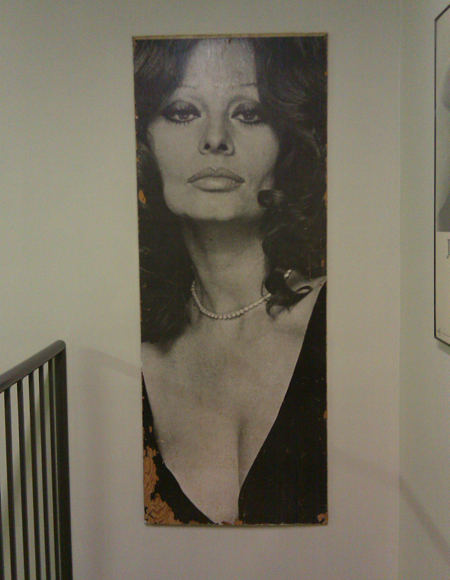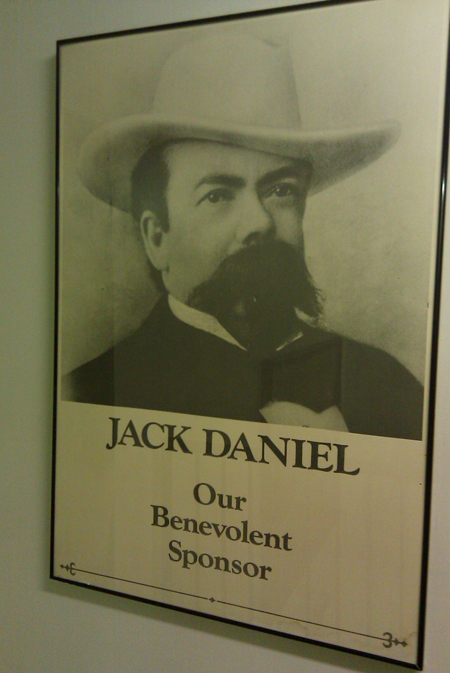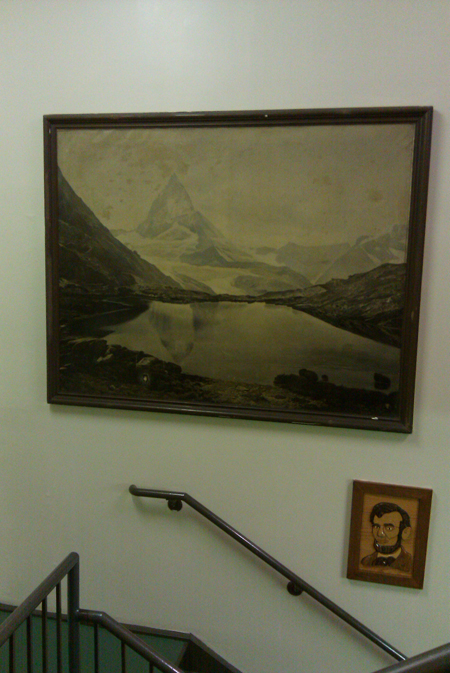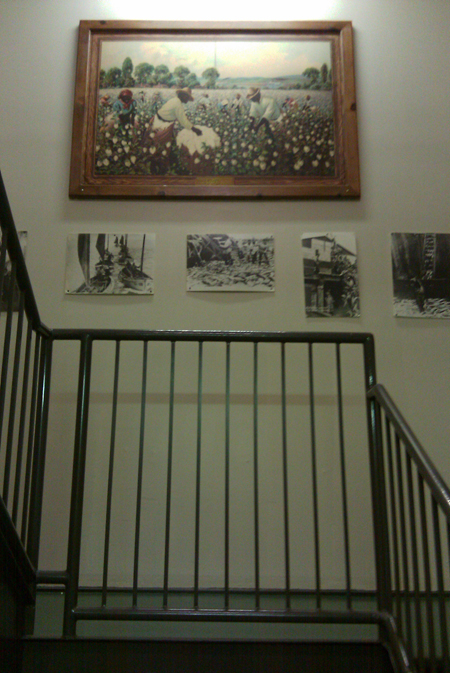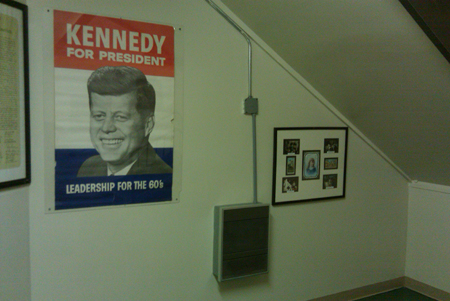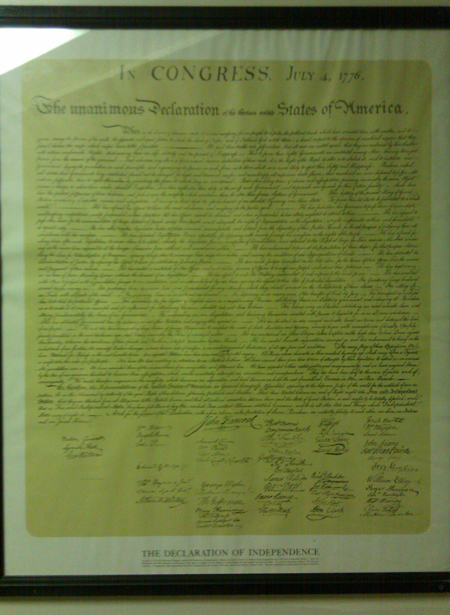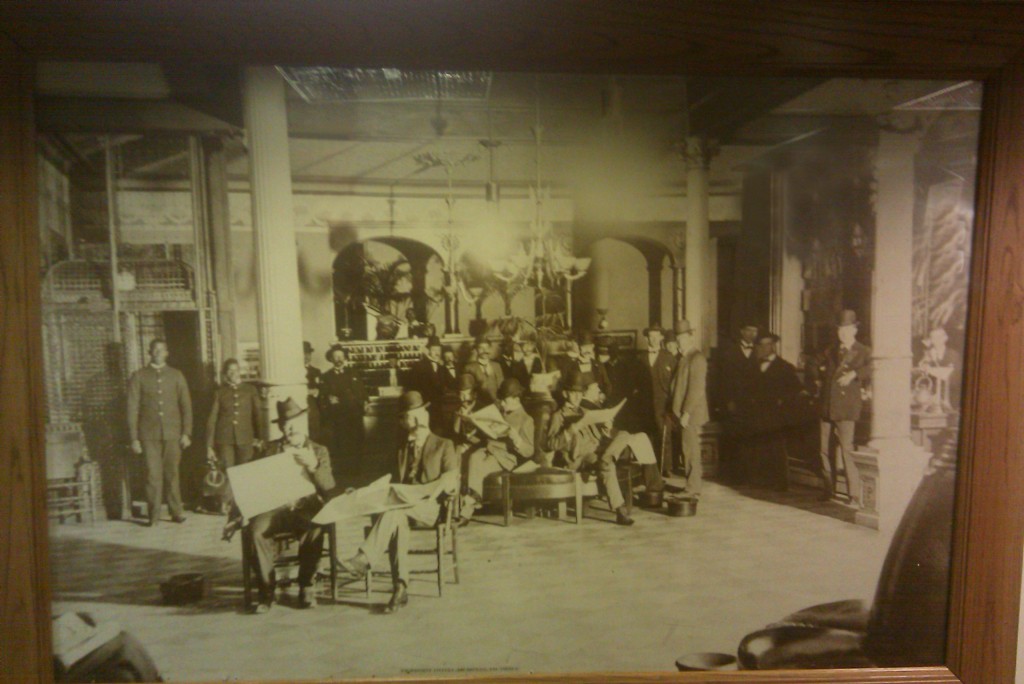Eric
Rhett Akins Plays Rome River Jam 2011
Even though summer hadn’t yet officially started, it sure felt like it when we pulled into Ridge Ferry Park in Rome, Georgia last Saturday to play at the fifth annual ‘Rome River Jam.’ It was just before noon and the temperature was already approaching 95°, the air thick with humidity. Yes, it was “fixin’ to be a hot one” as we would say in these parts, and that would be okay for this multiband festival.
We parked our bus in the fenced-off backstage area next to headliner, Darius Rucker‘s three buses and I stepped out to meet the stage manager and check out the grounds. With five acts on this bill there would be no sound check for us on this day, just a line check and monitor check immediately prior to our set – what is commonly referred to in the touring industry as “throw and go.” Still, there was work to be done so I got busy.
Under my direction, the stagehands loaded in our gear to one of the “sound wings” adjacent to the main stage, and our merch to the merchandise tent. I went on a mission to commandeer our “bus stock,” which, upon its arrival a short while later, was quickly devoured by our band and crew for lunch. After icing down some beverages on the bus for later, I had a runner take us over to the hotel for showers and a brief rest before our late afternoon performance.
Typically, I use this down time to check and respond to e-mails, return phone calls, and maybe squeeze in a quick nap before showering and returning to the venue. On this day, however, I did something I rarely do in hotel rooms on the road – I watched TV. Upon turning on the TV, the reality show “Pawn Stars” happened to be airing, so I gave it a chance. I would probably blow right by a show like this if scrolling through the channels at home, but for some reason, I found myself drawn in. The show was actually quite interesting, and at points, funny as hell.
A little while later we were all back at the concert site, and the first artist, Sam Hunt, was performing his set as the Park began to fill up. We began to hear about some inclement weather possibly moving in, the worst of it predicted to hit around 5:00 PM, which of course happened to be right smack in the middle of the set change prior to our performance. The local band playing just prior to our set, “Kneckdown” (which incidentally featured the events promoter, Jay Schell, on lead vocals), finished at about 4:45 and we began our set up. About 15 minutes later, almost as if on cue, the weather began to turn nasty. The wind picked up, the rain began to come down, and a portion of the crowd that had already grown to around 2500 ran for cover.
Fortunately, our stage had a pretty solid roof that extended past the edges of the stage, and this kept us and the gear dry, but it was still a frightening storm. The storm was packing wind gusts of up to 50 mph and was also accompanied by intense lightning, which was visible from the stage. I learned later that a tree fell on the adjacent property, seriously injuring two people who had to be rushed to the hospital. Resisting pressure from the stage manager and production company owner to start our set, we waited until the lightning had completely stopped to kick it off.
A few stressful minutes later the storm had passed, and the air seemed quite a bit cooler as we were now on the backside of a front that 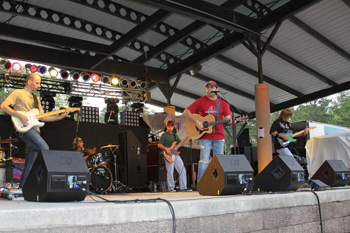 had moved through. After a brief introduction from the local DJ we were off and running. Despite the rocky changeover, we were off to a good start, and the crowd quickly piled back into the main area in front of the stage. Rhett was in a good mood, the band was playing great, and the fans got right into it. By the peak of our set the crowd had swelled to around 4000, many whom were singing along with some of Rhett’s latest songwriting successes, one of which was “Honeybee,” Blake Shelton‘s recent number one smash. We ended our 70 minute set with the anthem “Kiss My Country Ass,” and the crowd roared with approval.
had moved through. After a brief introduction from the local DJ we were off and running. Despite the rocky changeover, we were off to a good start, and the crowd quickly piled back into the main area in front of the stage. Rhett was in a good mood, the band was playing great, and the fans got right into it. By the peak of our set the crowd had swelled to around 4000, many whom were singing along with some of Rhett’s latest songwriting successes, one of which was “Honeybee,” Blake Shelton‘s recent number one smash. We ended our 70 minute set with the anthem “Kiss My Country Ass,” and the crowd roared with approval.
One of the cool things about playing festivals is the interaction between musicians and crew members from different tours. On this day I met Andrew, the merchandise person for country artist, David Nail; and Patrick, the fiddle player for Darius Rucker. Scott, our other guitarist, got to meet Darius and have a photo taken with him. Another cool thing about playing festivals is getting to hear these other artists and bands, and on this day, all the bands played great! It was a great concert, fun was had by all, and we got real lucky that the nasty storm didn’t end the day early for everybody. See you next time Rome!
I would like to thank local photographer, Andy Butler, for donating the use of these pictures. – Butler Photo/Cartersville Ga
Coming Gigs and Events
As some of you might know, there’s a lot going on in Nashville this week. It’s that time of year again where 250,000 country music fans converge on the city for “CMA Music Fest Week” (formally known as Fanfare). Tourists, country music fans, and curiosity seekers from all over the globe will fill the streets, shops, hotels, restaurants, nightclubs and concert halls, and while this can make getting around a little sticky for the locals, it is truly an exciting week for Music City, not to mention good for the local economy. This year, I am fortunate to play my own part in these festivities.
Thursday, June 9 from 11 AM – 2 PM I will be doing a book signing at the Charlie Daniels Museum on Second Avenue in downtown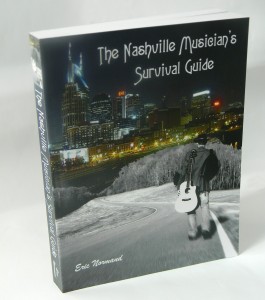 Nashville (between the Hard Rock Café and the Wildhorse Saloon.) This unique museum/gift shop began selling my book last week at which time I was fortunate to meet the museum’s owner, Bud Messer, who requested I come back and do and in-store signing during Fanfare. Bud is a great guy and I am honored to receive this invitation from such a prestigious institution, not to mention the fact that they are now selling my book. (The Ernest Tubb Record Shop on Broadway is also now selling my book.)
Nashville (between the Hard Rock Café and the Wildhorse Saloon.) This unique museum/gift shop began selling my book last week at which time I was fortunate to meet the museum’s owner, Bud Messer, who requested I come back and do and in-store signing during Fanfare. Bud is a great guy and I am honored to receive this invitation from such a prestigious institution, not to mention the fact that they are now selling my book. (The Ernest Tubb Record Shop on Broadway is also now selling my book.)
This Saturday, June 11 my band will be performing at The Fillin’ Station in Kingston Springs. The fun starts at 7 PM, and if the weather is good (which it looks like it will be), the outdoor patio will be open. This week the band will consist of me on vocals and guitar, Nick “Shaggy Bag” Forchione on drums, Tom Good on bass, and special guest Patrick Weikenand (formerly of the band “War”) on harp and beer slinging. This club is a one-of-a-kind experience, so if you’ve never been, you owe it to yourself to check it out. (no cover.)
Monday, June 13 I will be giving my first talk on the book when I host “The Nashville Musician’s Survival Guide Workshop” at Corky’s Ribs & BBQ, 100 Franklin Road, Brentwood, TN 37027. This luncheon will be sponsored by “Indie Connect” and held between 11:30 AM and 1:30 PM. Cost $10.00. This presentation will be somewhat informal and there will be a lot of questions and answers, networking and group interaction.
Other than that, it’s been hot as hell in middle Tennessee for the past month, and we’ve had over 10 straight days of 90° plus heat with no end in sight. Stay on the lookout for heat and poor air-quality advisories.
So that’s it for now, if you’re around, please stop in to one of my events or gigs and say hi.
Nashville News May 25, 2010: Indie Connect’s “New to Nashville,” and Derek St. Holmes at The Red Rooster
This past week in Nashville brought some new experiences to the table for me, and today I would like to share a few quick thoughts on these events.
Indie Connect and the “New to Nashville” Monthly Meeting
There is a Nashville-based music industry organization called “Indie Connect,” and once a month they have a “New to Nashville” meeting at The Red Rooster. I first discovered this organization last year when I stumbled across their website, a fairly elaborate site with all sorts of interesting and useful articles. Upon signing up for their newsletter I began to receive notifications about different meetings and workshops held monthly, themes ranging from “New to Nashville” to Songwriting, and “Singing in the Studio ” to PR Campaigns. While I’m certainly not new to Nashville, I have wanted to check out these meetings for a while as I have been asked to be a guest speaker at one of their luncheons next month.
The meeting, hosted by longtime Nashville songwriter Marc-Allen Barnette, was very laid back and began with each person in attendance sharing a little bit about their background, as well as their Nashville goals. After the introductions Marc began sharing his thoughts and views about being a songwriter in Nashville as well as some other perspectives about the scene. Several valid points were made regarding songwriter nights.
- Most of the accompaniment at the songwriter nights is done with acoustic guitar, so if you are a songwriter and plan on participating, it is to your benefit to be able to play acoustic guitar (or bring someone else who can).
- Most songwriters in Nashville write with co-writers, as cowriting expands the number of contacts who are connected to their songs.
- Support the songwriting community. If you’re performing at a writers round, stick around after your song is done to show support for the other writers.
After hearing some of us Marc’s ideas and advice, a back-and-forth conversation ensued with everybody participating and offering their thoughts and ideas. Also in attendance was Vinny Ribas, the founder of Indie Connect, and he also interjected his thoughts on different subjects. All in all the meeting was up tempo and informative and certainly worth checking out if you are “New to Nashville.”
Derek St. Holmes at The Red Rooster
Have you ever listened to the music of Ted Nugent? I have. I used to love hearing his song “Stranglehold” as it blared out of FM radios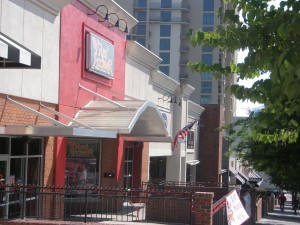 during my teenage years, back in the 80s. As distinctive as the guitar parts are to that song, the vocals are almost even more mesmerizing – a high and emotive rock and roll lyric belted out with power and conviction, by a distinctive and colorful voice. So maybe that’s why during our “New to Nashville” meeting on the outside patio of The Red Rooster last week it became difficult to focus on the discussion after the band began playing. Little did I know at that moment that the voice in the band that was booming out onto the patio was none other than that of Ted’s original lead singer, Derek St. Holmes. As I would later learn after the meeting let out, Derek lives in Nashville, and when he’s not on the road with Nugent, he can be found performing on Tuesday nights from 7 to 9 at The Red Rooster on Demonbreun Street.
during my teenage years, back in the 80s. As distinctive as the guitar parts are to that song, the vocals are almost even more mesmerizing – a high and emotive rock and roll lyric belted out with power and conviction, by a distinctive and colorful voice. So maybe that’s why during our “New to Nashville” meeting on the outside patio of The Red Rooster last week it became difficult to focus on the discussion after the band began playing. Little did I know at that moment that the voice in the band that was booming out onto the patio was none other than that of Ted’s original lead singer, Derek St. Holmes. As I would later learn after the meeting let out, Derek lives in Nashville, and when he’s not on the road with Nugent, he can be found performing on Tuesday nights from 7 to 9 at The Red Rooster on Demonbreun Street.
Even though I couldn’t see the band from where we were sitting on the club’s outside patio, I knew they were quite good from the moment they began playing. By the time they performed a blistering version of Jimi Hendrix’s “Red House” midway through the set it was obvious that this was not your typical Nashville bar-band. As I was firmly committed to the conversations at hand, I did my best to not be sidetracked by the music. But by the time they played the last song of their first set, which just happened to be the anthem “Stranglehold,” it was almost impossible to not become completely drawn in. This music is rock ‘n roll at its finest, and their performance was fit for a stadium crowd, let alone the 30 or 40 Nashvillians that had gathered on this cool spring night!
I left during their break as I already had commitments elsewhere, but as this is a regular Tuesday outing for this rock ‘n roll legend and his band, I’ll be back for sure.
After Thought:
Later on the next day, another significance of the Derek St. Holmes show occurred to me. The folks at this “New to Nashville” meeting were just that, new to Nashville. And the one thing most Nashville newcomers are lacking is contacts. The only reason I knew Derek St. Holmes was the performer inside was because I asked, mostly out of curiosity because it was so good. There were obviously some heavy hitters in his band too, all whom are likely connected to many other important avenues within the Nashville music industry and beyond. I recognized some players that work for national acts in the audience as well.
I guess it just goes to show that you never know who you might see or hear in a Nashville club. Next time you hear some great music by an unsuspecting bar band, stick around and listen a little, maybe chat with a few folks on the break. You never know what you might learn or hear. If you’re lucky, you might even hear “Stranglehold!”
Need help with your vocals? Check out Vocal Coach Extraordinaire, Judy Rodman
I’ve wanted to take a step with my vocal abilities for some time now and this year seemed like a good time to do it. A few months ago I dug out an old vocal method book, “The Rock ‘n Roll Singer’s Survival Guide” by Mark Baxter, a vocal coach I had studied with in Boston in the late 90s. After digging into it for a few weeks I came across one of the books many great recommendations – the importance of taking voice lessons from a vocal coach – and that was all I needed for encouragement.
I had recently heard some great things about Nashville-based vocal coach, Judy Rodman, so I decided to give her a try. In early March I took my first lesson at her home studio, a one hour session during which we covered a lot of ground. After discussing my current musical activities and goals, she began the lesson by demonstrating some “mechanics” about the human voice, partially aided by the use of models and diagrams. Then she took me through some warm-ups, all the while listening and observing my “habits.” Next, she had me sing a song of my choosing, and this is when it became even more apparent that she had a truly unique approach to vocal training.
After strapping on my guitar, she had me sing into a mic that was plugged into a couple of floor monitors to emulate a live gig. I don’t think I sang more than a verse before she told me to stop so she could address some issues. Apparently, years of guitar playing, combined with other “intellectual pursuits” had allowed me to develop some bad posture, posture that was restricting my vocal abilities. To begin correcting this, she had me sing while standing with my head and one heal up against the wall, while allowing my shoulders and back to be loose.
She also introduced some other concepts to improve my vocal “path.” One I found particularly enlightening was to pick an object or spot on the wall and imagine that it’s a person to whom I am telling a story. Another was to pretend I’m singing to a deaf person, to cause a deeper articulation of the words and phrases. Yet still another was to raise my eyebrows when I sing, as this expands “the cave” and will allow for a more resonant sound. By the time I left the lesson I was not only inspired to go home and practice, I had made an immediate and noticeable improvement.
Since that day I’ve taken a half-hour lesson every other week and have made great strides, and I actually look forward to practicing! Like any great music teacher or coach, Judy has a gift for custom tailoring each student’s approach and practice regimen; she quickly honed in on my problems and came up with the appropriate exercises and concepts to correct them, each lesson introducing new ones. If you live in middle Tennessee (or anywhere for that matter, as Judy also gives lessons over the phone or via Skype), and are in need of some vocal coaching, I highly recommend Judy, she is truly a vocal coach extraordinaire!
Well that’s it for today; it’s time to go sing!
Hampton Inn Caryville, TN – An American History Lesson
There was one bright spot on our recent concert destination to Speedwell, TN, and that was our brief stay at the Hampton Inn in Caryville, TN. We arrived back to the hotel around 3 PM on Saturday after our tense and stressful outing in Speedwell, and had about eight hours to pass while our driver, Steve slept. About an hour north of Knoxville, and nestled in the hills of the Smoky Mountains, at first glance this hotel simply looked like just another typical Hampton Inn, not unlike many we have stayed in over the years.
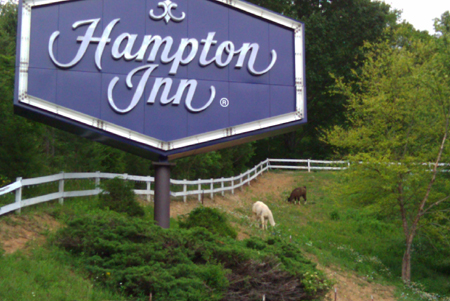 Perhaps the first giveaway that this place was a little different was the llama farm off of the back of the parking lot.
Perhaps the first giveaway that this place was a little different was the llama farm off of the back of the parking lot.
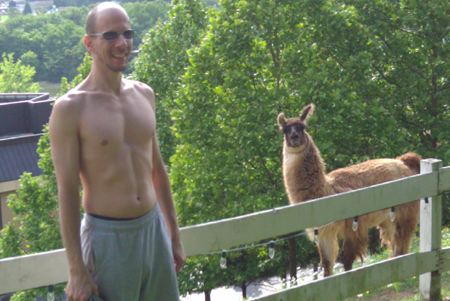 When we walked to the edge of the fence, one friendly fellow was kind enough to pose with me for a photo. Another peculiarity was a couple of old “Model-T” style cars, circa early 1900s, on display in front of the main entrance.
When we walked to the edge of the fence, one friendly fellow was kind enough to pose with me for a photo. Another peculiarity was a couple of old “Model-T” style cars, circa early 1900s, on display in front of the main entrance.
Upon entering the hotel and walking down a long hallway to our rooms we began to view some fascinating pictures and folk art lining the walls.
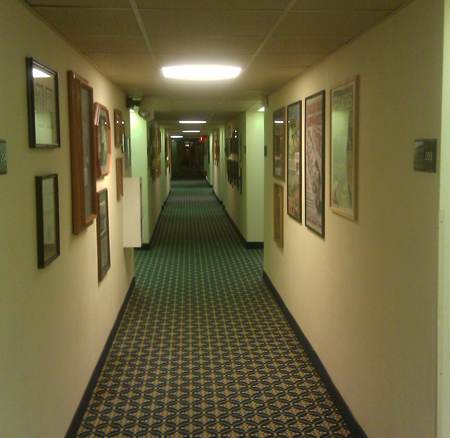 In fact there were so many photos, newspaper clippings, and other memorabilia, that Kelly and I decided to put our bags in the room and walk the halls for a bit to take a closer look.
In fact there were so many photos, newspaper clippings, and other memorabilia, that Kelly and I decided to put our bags in the room and walk the halls for a bit to take a closer look.
A common theme in many of the photographs was moonshining, and many of these photos were accompanied by descriptions.
The photos themselves told amazing stories, but upon reading the accompanying descriptions we learned that the owner of this hotel, Hack Ayers was a “third-generation moonshiner”, and his father was killed in a moonshine raid in the 1950s.
Other photos and news clippings told of a long-since forgotten era in our recent history when moonshining was an important part of the local economy of “the Mountain people.”
Other photographs captured a moment in time of a simpler, but very different America.
One of the most fascinating newspaper clippings was an original copy of a 1913 Boston Globe newspaper telling the story of the sinking of the Titanic.
There was plenty of unique folk art of lesser historical significance that still brought us back in time, like this original movie poster of the film “Casablanca.”
Even the stair wells were decked out with everything from photographs of movie stars to a John F. Kennedy campaign poster – a reprint of the Constitution to sharecroppers in the cotton fields.
Luckily, my phone takes a pretty good picture, as I had forgotten to bring our digital camera. After capturing a handful of these striking images, we decided to walk to a sitting area off of the front parking lot. We sat on an old ski lift chair that had been converted into a porch-swing and enjoyed a spectacular view of the surrounding mountains, and the lake below.
On our way back, we stopped by the front desk and I asked the receptionist about the history of all this décor. She informed me that “The owner likes to keep everything,” and that he owns another motel which is similarly decked out.
“Do people come here specifically to see all of this, or is it kind of an added bonus?” I asked
“I think it’s kind of an added bonus, but when people come back for the second time, they make it a point to see anything they missed the first time.” she responded.
She also told me that all these photographs and newspaper prints were originals. I thanked her for her hospitality and headed back to the bus, as it was just about time for us to be heading to Florida. This quaint, little gem of a hotel was definitely a bright spot on this day. The rooms were clean and comfortable, the staff was friendly and helpful, and the experience was unlike that of any other hotel I had ever stayed at. Luckily for us, this unsuspecting place is owned by a man who takes great pride in preserving American history and culture and, although I never met him, his passion for storytelling is evident by the astounding display he has presented.
Hotel room – $89 plus tax
Dinner at Waffle House – $7.63
American history lesson – priceless
“We’re getting out of here before the shooting starts!” – Country Music Festival Runs Amock
Our concert last Saturday in Speedwell, Tennessee was a wash, and not because of the rain. We arrived on site to this would-be country Woodstock a little after noon, and from the moment I stepped off the bus I knew something wasn’t quite right. You could just sense and feel the tension in the air.
Everything was in place for this mega-country bash – a great lineup featuring Rhett Akins, Jimmie Van Zant, Confederate Railroad,Bush Hawg, Matt Stillwell, and several others; a great concert stage and production; vendors; campsites – yes, everything was in place, except for the people. Somehow, despite considerable advertising, there were only 100 or so folks scattered across the giant field in front of the stage on this second day of the festival.
At this point we still remained optimistic as there have been plenty of shows that started out this way and still turned out okay. But our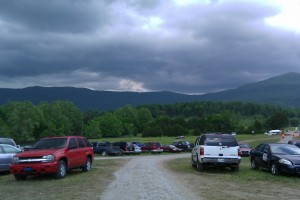 optimism would begin to fade quickly. As I began walking around looking for the promoter’s office, I started overhearing conversations that the festival was falling apart. Somebody said that the promoter was running out of money and that “the beer truck and the Porta Potty Company were pulling out.” Obviously, this wasn’t very encouraging news.
optimism would begin to fade quickly. As I began walking around looking for the promoter’s office, I started overhearing conversations that the festival was falling apart. Somebody said that the promoter was running out of money and that “the beer truck and the Porta Potty Company were pulling out.” Obviously, this wasn’t very encouraging news.
A few minutes later I found the promoter’s office and was greeted by the contact with whom I had advanced the show. When I asked him how it was going his reply was honest, but grim.
“Not good at all. The promoter is out of money and I’m not sure how this will all go down.”
“I suppose this means we won’t be able to get our bus stock?” I replied, half jokingly.
He responded, “That was one of the first red flags. When I told him I needed $300 to get bus stock for the different bands, he said he didn’t have it.”
“Ookaaay. I guess I should talk to him so we can figure out what we’re doing. ” I replied, realizing that if a three day festival was broke at noon on Saturday, and already losing their beer truck, that things could get ugly.
I walked into the next room to speak to the promoter, and saw that he was in a meeting with a couple of other event coordinators and three or four state police. Realizing this was not a good moment to approach him, I returned to the bus to tell Rhett and the gang of the situation. No sooner had I opened the bus door when a tall fellow wearing an orange “security shirt,” and sporting some really bad teeth, poked his head in and yelled into the front lounge where Rhett was sitting.
“Is that him, is that Rhett Atkins?” he yelled, incorrectly pronouncing Rhett’s last name.
“No, I’m Ricky Nelson.” replied Rhett playfully.
The fellows reply was astonishing, “You ain’t nothin’ to me, you’re just another feather in my bird!”
Quickly ushering him out the door, I assumed he was just really stupid and socially inept, or that maybe perhaps he was a meth-head.
A few minutes later I walked back to the promoter’s office to find out about getting some food. I asked if we could get some meal tickets for catering and if we could at least get a case of water and a case of beer. I was presented with meal tickets which were good for some “ham sandwiches” and chips, and I was also presented with an interesting box of bus stock consisting of:
1 case of spring water
1 open case of Bud Light (with about 8 beers in it)
1 jar of peanut butter
1 bag of corn chips
1 open bag of potato chips (about half full)
“Thanks, I guess somebody was already hungry.” I said, amazed that we got anything at all.
A little while later I was able to finally speak to the promoter who informed me that it was our option to play, and that he might be able to pay us “some money” but that it was unlikely he would be able to pay us our entire fee, and that this would be the case for the other bands as well. I told him I would check with the boss and get back to him.
After relaying all this to Rhett, he decided that in spite of not getting paid that we might as well play anyway, as we were already there. On the way back to the promoter’s office to relay this message some other folks who were hanging around backstage told me that they had heard the Porta Potties would be pulled out by seven o’clock, at which point the police or Board of Health would shut down the festival. When I asked one of the state troopers if he had heard anything like this, his reply was “yes, I have heard those rumors too, but I can’t confirm anything. I can tell you that we are pulling out our extraction team and that the remaining officers will be stationed on the perimeter.” I wasn’t entirely sure of this significance, but it sure didn’t sound good.
As I approached the promoter’s office, I could hear a loud argument. In front of the main entrance stood a big, tall state trooper, his arms folded in front in an intimidating power stance. As I got closer I heard several event workers demanding to see the promoter about their pay, as they had apparently heard rumors that they were going to get stiffed.
“I need to see him now!” demanded an angry worker.
“I’m sorry sir, nobody can see him right now.” the trooper stated firmly. After another minute of yelling and arguing by the crowd of 8 or so, the trooper restated his position – “Nobody is going to see him right now, I’m just doing my job and trying to make sure that nobody gets hurt or shot!”
Over my seven years of working as a road manager, this was the first time I had ever heard or seen anything quite like this, and the angry mob-like scene was enough to send me scurrying back to the bus. Along the way back to the bus a drenching rain set in, and we overheard more angry workers with comments about people getting shot. This would-be country Woodstock was beginning to look more like Altamont – only without the masses. Despite Rhett’s willingness to play for free, in light of the most recent developments, we decided it was best to head on down the road. I’ll have to check, but I’m pretty sure that getting shot is not one of the requirements in our rider.
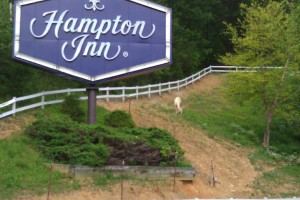 After our hasty retreat we arrived safely back to our hotel, the Hampton Inn in Carryville, TN. A little while later, Nick, our drummer, received a text from one of his friends who was playing in another band at the festival – something to the effect of “We’re getting out of here before the shooting starts!”
After our hasty retreat we arrived safely back to our hotel, the Hampton Inn in Carryville, TN. A little while later, Nick, our drummer, received a text from one of his friends who was playing in another band at the festival – something to the effect of “We’re getting out of here before the shooting starts!”
From what we could tell, there were no riots and nobody got shot at the festival. But still, the whole situation was quite unnerving and unfortunate. Obviously, several other bands besides us were leaving town without their pay, as were many vendors and event workers. The festival goers who were in attendance were ultimately shortchanged. And the promoter obviously lost his shirt, not to mention credibility.
On a brighter note, we did have a great time hanging out at the Hampton Inn and the guys did enjoy a fabulous dinner at the local Waffle House!
Apopka, Florida here we come!
The Hampton Inn in Caryville, TN, was the most unique Hampton Inn we have ever visited – the walls of the lobby, hallways, and stairwells covered with hundreds of old photographs, newspaper clippings, and folk art and providing a retrospective of the old South. It even had an adjacent llama farm. I’m going to try to write a blog over the next couple of days as there’s not enough space to do it justice here.
Music Careers in Nashville – To Be or Not to Be
So far, the feedback I have received on my book has been very positive, and I’m thrilled about that. Several people who purchased the book have e-mailed me and share their thoughts; I’ve even had some European interest. However, a Craigslist response last week to one of my recent blogs brought up one issue that I must address.
The response was to my last blog “The Benefits of Having, and Being a Mentor” and, while it completely missed my point about mentoring, the writer stated views that “the music business is the biggest waste of human activity” and something else to the effect of ‘why should young people have to spend years playing in bars to get good or make connections?’ This person was obviously taking a shot at me and my book, while it was clear from the rhetoric that he or she formed opinions based only on reading a couple of my blogs, without actually reading the book.
So for the record, here are some of my thoughts regarding music careers in Nashville (or anywhere for that matter).
When I started writing this book, my intention was to present a document that would help “fill in the blanks” for both newcomers to Nashville and people who are considering relocating here. I wanted it to be full of useful information that would simply help musicians’ gain perspective about what’s here and I believe the finished book does just that. But it’s definitely not a “get rich quick” angle. I don’t make any promises; I’ve done my best to simply present information about the Nashville music industry from a journalistic standpoint.
In fact, nowhere in the book do I suggest that moving to, or embarking on a music career in Nashville (or anywhere else) is a good idea. For that matter, nowhere in the book do I state that it is a bad idea. People have been selling the farm and moving to Nashville to fulfill their musical dreams for decades. The way I see it, people are going to chase their dreams no matter what I write in a book or a blog, and the last thing I’m going to do is try to talk someone out of their dreams.
Do I think that the music business is a waste of human activity? It might be for some, but those folks will never know if it is until they try. And once they have it in their head that they think they can succeed, no one is going to be able to “talk them down from the ledge.”
In the foreword to my book I write “many find out that the music industry of Nashville is not what they thought and are unable to achieve their dreams and aspirations, often resulting in a premature and hasty exit.” This is one of the first lines in the book and reading it today makes me think of something one of my professors at Berklee once told me. It was my first day of “Harmony” class way back in 1988 and the professor began the class by saying “80% of you will not survive your first year at Berklee.” He wasn’t trying to paint a picture of gloom and doom, he was simply trying to instill that what we had chosen to pursue is extremely challenging, perhaps much harder than we were prepared for, and that it was simply a statistical fact that more would fail than would succeed.
This sums up the music business perfectly. It is extremely challenging, much more difficult than you could ever prepare for, and only a small number of those who try will succeed. But this doesn’t mean that it is a waste of human activity, or that some people shouldn’t try. Like I said, it’s not my place to talk people out of their dreams. My whole angle is, if you’re going to try to build a successful career in the music business, understand how hard it is and prepare yourself for the road ahead. Arm yourself with as much knowledge as you can. Practice your instrument and become a great player and play music with others often. Learn how to enjoy playing nightclub gigs, for these are the majority of gigs most musicians will play. Read as many books, magazines, and articles about music, business, and life as you can. Talk to others in the business to gain perspective. Be a good person and contribute to the community in which you live. Work hard, bring something to the table, and don’t be afraid to put your chips down. And HAVE A BACKUP PLAN – be good at doing something else too!
The music business is an extremely competitive and difficult endeavor to succeed in, and making it work in Nashville is just as hard, if not harder than it is anywhere else. I don’t have all of the answers, I just know what worked for me and am sharing that with the hopes it might help a few others along the way.
So what are you waiting for? Buy my book today 😉
The Benefits of Having, and Being a Mentor
“Teaching is the profession that teaches all the other professions.” – Author Unknown
When I first arrived in Nashville in 2002, I realized that to succeed in this massive and confusing music industry I would be faced with great challenges in the months and years ahead. I was fortunate, however, as I had a good friend in the industry – one who had already paid his dues and found some success here, and he helped to illuminate a path that worked for me. He was my Nashville mentor.
“You may be only one person in this world, but to one person at one time, you are the world.” – Anonymous
He didn’t consider himself a Mentor, or teacher, he was simply a good friend helping another friend. But I was clueless about how this music industry worked, so to me he was a lifeline of information and inspiration. He knew I needed this guidance and direction, and for whatever reason, he decided to invest in my future. He went out of his way to help me on many occasions – advice-filled phone calls, one-on-one guitar lessons, trips to the music store to check out new gear, introductions to friends in the business, he even gave me an electric guitar.
“The dream begins with a teacher who believes in you, who tugs and pushes and leads you to the next plateau, sometimes poking you with a sharp stick called ‘truth.’ “- Dan Rather
What he offered that probably helped me the most was insight and advice. He had already been working in this town for 10 years at this point in time, so he had a great perspective of a much larger view of the music community than one could see quickly. His accumulated wisdom also allowed him to see my strengths and weaknesses. After one embarrassing moment in a Nashville nightclub, one where I sat in and played a style in which I was in over my head, he was compassionate, but brutally honest.
“You might want to stay away from downtown for a little while; you need some more wood shedding.”
As much as I didn’t want to hear this, I knew it was the truth and I knew that there was more work to be done. Over time, I improved my weaknesses, largely thanks to his advice and suggestions, and returned to the in-town nightclub scene better prepared. I eventually wound up playing as a sideman on tours, recording on songwriter demos, etc. and I have been fortunate to wind up in the category of musicians who find a way to survive Nashville. If it weren’t for the great help I was given early on by this generous human being, who knows how it all would have turned out.
“A teacher affects eternity; he can never tell where his influence stops.” – Henry Brooks Adams
Years before I moved to Nashville I was a guitar teacher in New England. I taught 30 to 40 students privately per week. I did my best to help all of them, but some were more receptive than others, and for many my teaching went beyond the half-hour lesson – helping them pick out instruments, inviting them to sit in with my band, phone conversations – I gave more than I was expected to because it felt like the right thing to do.
Now, 10 years later, I have learned that one of these students is a guitar teacher himself and plays in a successful nightclub band as well. Another one of these students that received some extra “mentoring” went on to graduate from the Berklee College of Music and is earning his living as a touring musician. And still another former student, one who earns his living in the corporate world, continues to enjoy the healing power of music in his private life.
“There are two way to live your life. One as though nothing is a miracle, the other as though everything is a miracle.” – Albert Einstein
I too believe that life is a miracle and shouldn’t be taken for granted. Long before I had my Nashville mentoring, there were several other “mentor-like” figures in my life. These people acted in a selfless way, reserving judgment, and accepting me as I was, while doing many great things to help me become a better person. My wife, Kelly is one of these great people. To this day, she continues to help me shape my life in a way that makes me better, while still accepting me for who I am.
At this point of my life I am glad to be in a position where I can help some others along the way. For many, the Nashville dream is a tough row to hoe, and the book I just wrote is designed to help some of these struggling folks – kind of my way of paying it forward. And when someone asks me for advice I always do my best to offer insight that will really help that person.
So I urge you to take a minute and ask yourself a couple of questions – Who in your life is looking to you for answers? How can you help them on their path? If you put your best foot forward and help a few folks along the way, if nothing else, you’ll sleep better at night knowing that you did your small part to make the world a better place.
“Together we can change the world, one good deed at a time.” – Pay it Forwarders everywhere
As some of you may know, and for those of you who don’t know, I have just released my book “The Nashville Musician’s Survival Guide.” This street-level perspective of the music-related jobs in the Nashville music industry is now available in print and eBook versions. To purchase your own copy, follow this link.
The Nashville Musician’s Survival Guide eBook, and eBooks in General
Today marks another milestone in my self-publishing book adventure, that being the arrival of “The Nashville Musician’s Survival Guide” epub and Kindle versions. I am pleased to announce that these digital formats are now available for purchase on my web-store for the low price of $9.99.
While I am still a big fan of old-fashioned paper books, and the original vision of my book was one which was printed on paper, I do see the practicality of eBooks and understand their growing popularity. In this hyper-digital world it comes as no surprise to me that printed books are starting to fall by the wayside, similarly to the demise of CDs, VCR tapes, and newspapers. But I believe there will always be a place for printed books, and therefore my book is available in both print AND electronic versions.
When the printed version of my book was complete I focused on the eBook conversion and hired a company that specializes in this work, eBook Partnership. During this process I learned a lot about the benefits and drawbacks of eBooks.
Here are a few benefits from the reader’s standpoint:
- A person can now carry hundreds of books in one small device.
- They are delivered almost instantaneously.
- They require no packing or shipping expense.
- They can show links, allowing easy access to related information and websites.
- Fonts can be resized to allow easier reading.
A few benefits from the self published author’s standpoint:
- The sale and transaction are instantaneous.
- They require no packing or shipping.
- They’re easier to sell internationally as shipping packages abroad is very expensive.
- They can be more affordable to the masses as they’re typically less expensive than printed books.
- They require essentially no storage space.
It all seems too good to be true, especially from an author’s standpoint. Well after a bit of research I learned that they are just a little too good to be true. Despite all these advantages there are some drawbacks:
- If your battery dies and you aren’t somewhere where you can plug it in your screwed.
- ebooks lack the look and feel of a traditional book – i.e. cover, pages, binding, etc.
- Unlike traditional books there is no market for used eBooks, so a reader can’t recoup some of their original investment.
- And perhaps the biggest drawback from an author’s standpoint is that eBooks lend themselves to piracy.
As we all know, when the music industry went digital, this was the start of the illegal filesharing era. Similarly to the MP3, the eBook is also far more prone to theft than its predecessor, the paper book. As the day on which I would release my own eBook drew near, I started looking into ways to protect my electronic book from piracy. I learned that there are protections that can be applied to my eBook to prevent this kind of theft but this would be expensive, and it would not be foolproof.
The truth is that even Kindle and ePub versions of books with the most advanced piracy protection (like the kind of protection applied to eBooks sold on websites like Amazon and Barnes & Noble) could be disabled by the savvy computer hacker. In other words, if somebody really wants to they can take any eBook, disable its copy protection, and pass it around the Internet as fast as a jar of moonshine will get passed around a Kentucky campfire.
Matt Horner, the eBook designer who worked on my project offered the following thoughts on the matter
“Overall, the value of DRM [Digital Rights Management/Copy Protection] is debatable and anyone who is set on copying your eBook would be able to strip the DRM from it within minutes by downloading free software from the Internet. My advice would be to price your eBook sensibly, accept that there may be some piracy, but assume that the majority of people are honest and would rather buy a reasonably priced eBook than download a pirated copy.”
So I have priced my eBook very reasonably – hence $9.99 (thousands of hours went into this project so I can’t simply offer it for free.) I hope that most musicians, the prime audience for this book, realize that this work has value, similarly to the way a songwriter or artist places value on their work.
So steal it if you must, but if you truly want to help preserve the noble endeavor that being an author or songwriter requires, follow this link and get your copy of “The Nashville Musician’s Survival Guide” today!
When in Doubt, Lay Out
Have you ever found yourself in a situation which required you to play a song you did not know? Perhaps you’ve had to play unfamiliar material while sitting in at a blues jam or open mic. Or maybe when an audience member shouts out a request and your band attempts it even though none of you have ever played it before. I have been in these situations countless times. I’ve even been in situations where an artist decides to attempt an unfamiliar tune with the band hanging on for dear life, in front of thousands of people.
In these unnerving situations I have learned to embrace some great advice from my mentor “D” – “When in doubt, lay out.” That’s right; if you don’t know what chord or note is coming next, don’t play anything. Sometimes it’s better to leave some gaping holes in the music than it is to take a chance on playing “the ugly chord.”
One thing I have learned is that a song won’t completely fall apart if you simply miss the downbeat of a few chord changes. Songs have momentum, and a lot of this momentum is carried by the vocalist and the overall groove. As long as there is a lyric and melody happening over some kind of basic “chug factor” the audience won’t miss a few guitar chords or bass notes here and there. Of course if it’s the bass player that doesn’t know the tune, it’s a lot easier for the song to fall apart, as incorrect root motion might derail some of the other players.
One of my favorite tricks for getting through an unfamiliar tune is to avoid playing thirds. In many cases, the melody will dictate whether or not the song is in a major or minor mode. But in some situations the melody might be too ambiguous for this to be obvious. So if you only play chords containing roots and fifths, nothing will sound wrong.
Another concept I have engaged in is to play very lightly through the first verse and chorus, while intensely listening to the lead melody sang by the vocalist. By playing lightly it becomes easier to hear the vocals, giving me some time to figure out what’s going on. Melody dictates harmony, so there’s a lot of information in that first verse and chorus. After I make it through the first verse and chorus and know a little more about the songs melody and chord changes, I might dig in a little harder the next time around.
But by the time the song reaches that all-so-elusive bridge, this is where many players can get into trouble on unfamiliar tunes. In the words of Dirty Harry – ask yourself one question – “Do you feel lucky?” Do you feel brave enough to take a chance, and guess what chord is coming next? Maybe you’ll get it right and look like a big hero. But if you guess wrong and play a big old ugly chord, you might find yourself as the conductor of a good old-fashioned train wreck and derail the whole song.
“When in doubt, lay out”
As some of you may know, and for those of you who don’t know, I have just released my book “The Nashville Musician’s Survival Guide.” This street-level perspective of the music-related jobs in the Nashville music industry is now available in print version, and the e-book will be available within a few days. To purchase your own copy, follow this link.

